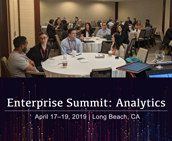Using Data and Analytics to Improve Student Success
A summary of the 2019 Enterprise Summit: Analytics
“The greatest potential for building effective institutional research is leveraging talent across the institution.” (from the Statement of Aspirational Practice for Institutional Research)

Strengthening collaborations among leaders from institutional research, information technology, and business offices around the use of data and analytics for the benefit of students was a primary focus of over 200 leaders attending the 2019 Enterprise Summit: Analytics on April 17-19. The summit is an annual event co-sponsored by the Association for Institutional Research (AIR), EDUCAUSE, and the National Association of College and University Business Officers (NACUBO).
The future expansion of analytic tools and applications within higher education was a core topic at the Enterprise Summit and participant Elisa Hertz, the Director of the Center for College Effectiveness at Stella and Charles Guttman Community College, appreciated the emphasis on sharing expertise across organizational units when discussing the future of data and technology:
“Technology-rich. Data-driven. Student-centered. Future-focused. The 2019 Enterprise Summit in Long Beach, California united IR, IT, and business professionals interested in working across traditional organizational lines and sharing their expertise about data governance, dashboards, predictive analytics, and ethics. It was affirming to witness AIR, EDUCAUSE, and NACUBO leaders and members model the type of partnerships that would benefit all institutions.“ – E. Hertz
With the use of analytics to improve student success losing momentum in some instances, Yuko Mulugetta, Chief Analytics Officer at Ithaca College noted the importance of timing and collaboration in regaining a sense of purpose and resolve to tackle the challenges faced by students.
“At this year’s Enterprise Summit, I felt a real sense of urgency among the community to provide analytics-based answers to key strategic questions such as 'Which students are most likely to leave the institution and why?' and 'How can we help students return to us next year?' IR professionals cannot do this analytics work alone. The urgent need for analytics calls for close collaboration among IT-IR-Business officers.” – Y. Mulugetta
One highlight of the Enterprise Summit was an inspiring opening keynote by the President of Long Beach Community College, Dr. Reagan Romali, who urged Summit participants to act now by focusing on how to better create clear, actionable, and understandable information that is available to users across an institution. Shama Akhtar, Director of Institutional Research at Bowie State University, reflects on the messages from the keynote and the crucial need to advance the use of analytics to provide users with the information they need to make decisions.
“A sense of urgency – that is what I saw and heard at this year’s Enterprise Summit - to move the needle from where we are, to where we need to be in order to provide, as President Reagan Romali said, ‘the right data, the right analysis, to the right people at the right time.’ “ – S. Akhtar
To provide information that is accurate, useful, and timely, requires data to be brought together across an institution, with multiple teams working toward the same goals. Rick Burnett, Associate Vice President for Academic Affairs and Institutional Data Administrator at Florida State University, came away with fresh insights and a new energy to tackle challenges at his own institutions.
“In an environment where everyone is hungry for data and few people are aware of the full institutional perspective on data, it is great to have an event like the Analytic Summit where you can gain insights from your IR peers and from CIOs, CFOs and CDOs. This eclectic and data-centric group wrestled with the problems we all encounter: the changing face of analytics, how to drink data from a fire hose, how to filter and present the right data for strategic positioning and decision making, and the growing issues around data governance. The Summit left us with an imperative to go home and make a difference with data on our campuses. I felt emboldened by the charge to take aggressive stance with data use at my campus.” – R. Burnett
Overall, the Enterprise Summit was an opportunity for IR leaders to learn from other professionals and to develop short- and long-term strategies to increase the use of analytics at their own institutions in pursuit of improved student success and greater operational effectiveness. A key message was the need to act now and in collaboration with others.
“As a first-time attendee at the conference, I valued the opportunities to learn, network, and present at this co-hosted event. It brought to life the concept articulated in AIR’s Statement of Aspirational Practice for Institutional Research, ‘Data are everywhere across institutions of higher education, and access to analytical tools and reporting software means that a wide array of higher education employees can be actively involved in converting data into decision-support information. As such, models of decision making are changing, which opens new opportunities for wise use of data resources’ ” (Swing & Ross, 2016, p.3). – E. Hertz
More information on the 2020 Enterprise Summit: Analytics will be available in late fall of 2019.
